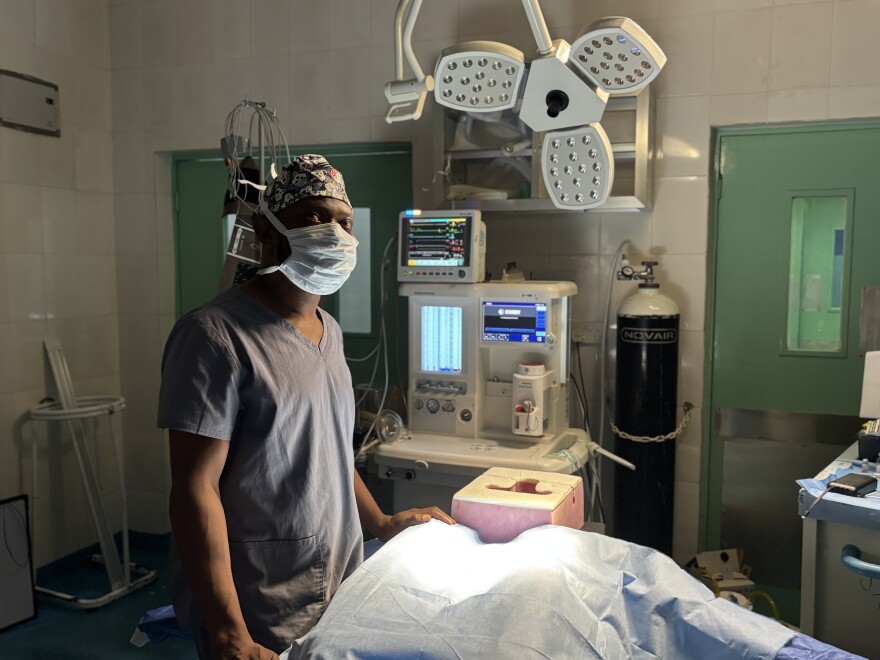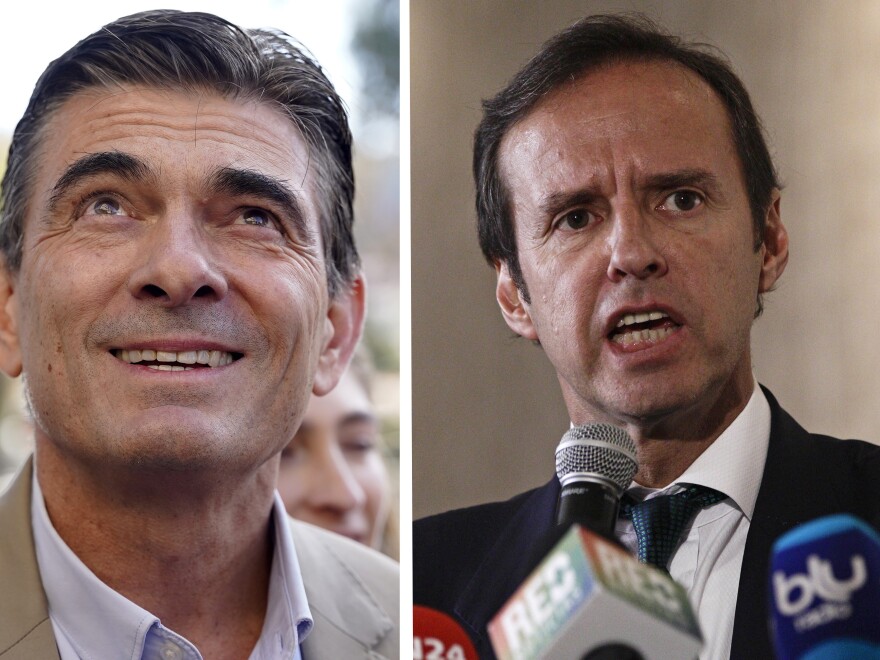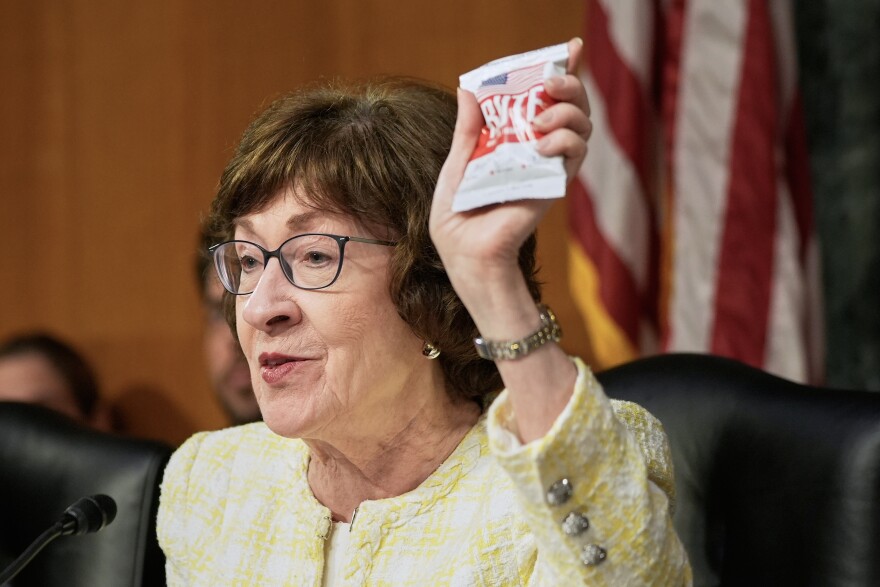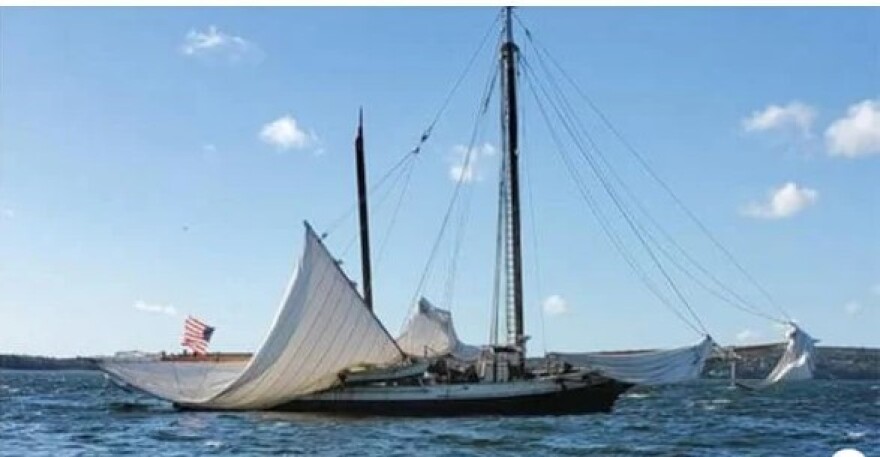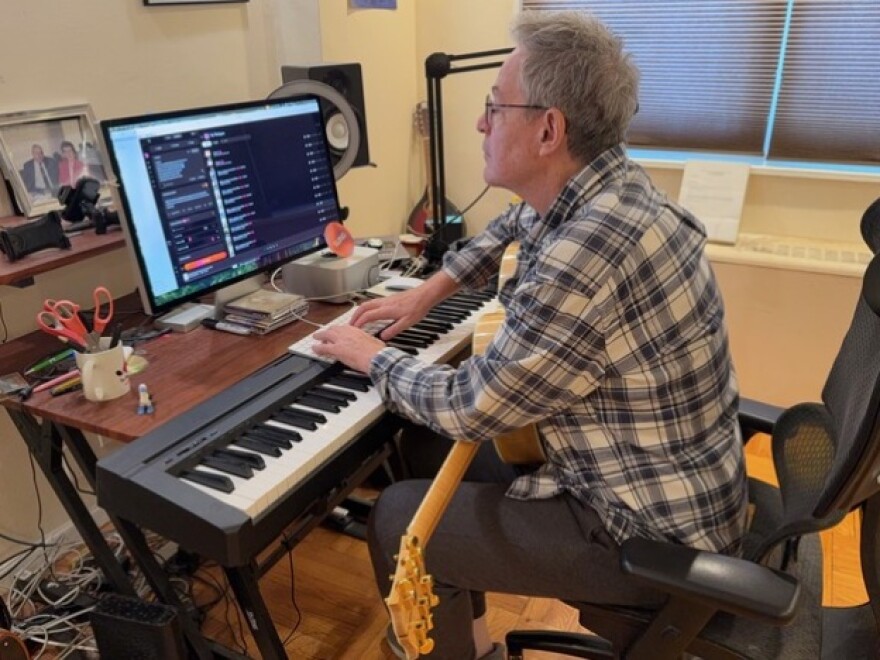In the muggy heat of Sierra Leone, 56-year-old father of three Morie Abibu lays on a hospital bed. He is paralyzed starting at the neck. His frail muscles sag and pool on the bed, barely clinging to the bone after months of inactivity. His spinal cord is being compressed by a developing tumor at the base of his head. Additionally, as it spreads, it blocks the nerves that regulate his breathing. He is slowly dying from suffocation.
Neurosurgery is required for Abibu to relieve the lethal pressure.
“Without it, he will have a devastating end of life,” saysDr. Marco Lee, past president of the Western Neurosurgical Society. “When your breathing starts to go, it’s like this constant feeling of drowning.”
Before this year, Abibu would have ended up like that, but now he is at Connaught Hospital, where he is being treated by Dr. Alieu Kamara, Sierra Leone’s first and only neurosurgeon. Since beginning his practice in early January 2025, Kamara has been dealing with the neurosurgical illness burden of a whole nation of eight million people, including catastrophic injuries, spinal paralysis, seizures, and brain tumors.
“Before Dr. Kamara, there was no hope,” stated Dr. Kehinde Oluwadiya, the University of Sierra Leone Teaching Hospital Complex’s acting head medical director. “You will travel to another nation and receive treatment if you are fortunate and wealthy. However, if you’re not, you’ll either die or have severe disabilities.
Five months after Kamara’s practice opened, two Stanford surgeons, Drs. Seunggu Han and Silvia Vaca, as well as April Sabangan, CEO of Mission Brain, a nonprofit organization based in California that advances global neurosurgical care, came to support the new service.
Three rotating anesthesiologists, a group of nurses, and two operating rooms shared by all surgical specialties make up Connaught Hospital’s surgical ward. In the recently established neurosurgery department, Kamara is the sole physician.
They met Morie Abibu there.
An incision is made, the power goes out
The surgical room needs to be prepared before Abibu’s procedure. He is supported by makeshift braces made out of rolled-up surgical gowns secured with masking tape. Someone climbs a ten-foot ladder to replace the burned-out ceiling bulbs. To keep any flies from falling on the sterile field, another nurse uses an electric-powered swatter to swipe at the insects that had sneaked in prior to the procedure.
Kamara is the first to cut. The brown, leathery skin of Abibu is prone to splitting. Vaca hands Kamara forceps that apply regulated electricity. He begins burning through muscle and fat. Holding the vacuum, Han draws fluid and blood. It’s a delicate dance. Cut, suck, burn.
After an hour and a half, Kamara extracts a piece of rough, spongy bone with her tweezers. Like a piece of molding cheese, it is mottled, dark from the tumor and yellow from the aberrant growth. When put into the metal tin, it clangs. The spinal cord’s smooth, whitish tube is seen beneath the bone. On top of a river of blood, it appears to be a piece of white rubber. An encouraging indicator is that Abibu’s heartbeat is pulsing via the spinal cord.
The lights abruptly go out. Darkness descends on the room. During Sierra Leone’s rainy season, power interruptions are frequent due to strong storms. The only lights shining on Abibu’s bloody, bone-covered incision are the tiny, battery-operated surgical spotlights that Vaca and Han brought with them. The operation is unstoppable. The danger of surgical problems rises with each minute Abibu is left open on the operation table.
Vaca leans down, bringing her surgical headlight closer to the wound to help Kamara see. He keeps the bleeding under control and smoothes the edges of the bone that’s left. The spinal cord could be cut with a single misstep. Fortunately, the lights flicker back to life a minute later when the emergency generator starts up.
During the operation, the power goes out twice more.
Three hours later, everyone lets out a collective exhale as Kamara completes covering the incision with a line of fourteen staples.
They recently finished the nation’s first spine operation.
It started with a broken arm
The 43-year-old Alieu Kamara was born in a small eastern Sierra Leonean community. Conflict hampered his career in medicine. He grew up throughout the 11-year civil war. In order to avoid rebel attacks, his family frequently had to hide in the bushes in the countryside, sometimes for days at a time.
Kamara unintentionally fouled his friend during a secondary school soccer match, causing him to fall and break his arm. Kamara decided to become a doctor after witnessing his friend’s suffering and being powerless to assist. After studying hard to pass his medical entrance exams, Kamara didn’t have the means to pay tuition. He worked in a factory for two years, producing plastic bags and bowls. It was still insufficient.
By chance, he learned about a scholarship to study medicine in Jilin, China at that time. He trained there for 12 years, receiving both an MD and a Ph.D. in orthopedic surgery before returning to Sierra Leone in 2020.
Kamara would return home and operate at Connaught Hospital on patients who had fractures and fractured bones. However, patients with head and spine injuries could only receive orthopedic therapy because there was no neurosurgery ward. Many of their injuries had resulted from blunt trauma or falls, which called for neurosurgical expertise that he lacked. The system was flawed. Either Kamara could turn them away or try to stabilize them. But that wasn’t always possible.
“We used to lose a lot of patients due to head injuries, spinal cord injuries, spine fractures and the like,” Kamara stated. “There was nothing we could do for them.”
It was clear: The country needed a neurosurgeon. And he wanted to pursue training to be the first.
It takes a network
Giving Abibu a chance at life again took more than a single surgeon. It required an expansive grassroots network.
In 2021, Fatu Conteh a neurosurgery resident in California who fled Sierra Leone during the civil war visited her home country. On her third day, her grandmother had a stroke. She frantically drove her grandmother to Connaught Hospital. Without access to timely treatment, she became paralyzed and wheelchair-bound. In disbelief and determined never to let this happen to anyone else, Conteh connected with Dr. Sonia Spencer, the chairperson of the hospital complex.
“Then the dream was born to bring neurosurgery to Sierra Leone,” Spencer said. “I told Fatu, ‘Go find us some partners.'”
Conteh cold-emailed neurosurgeons involved in global health, scheduled calls with nonprofits and chased tentative commitments and unfulfilled promises. Progress was slow until she metDr. Kee Parkin 2022 over Zoom. As co-chair of the Global Neurosurgery Committee from the World Federation of Neurosurgical Societies, Park had connections internationally. His excitement for the project was infectious. He was constantly creating email chains and setting up meetings between Conteh and his colleagues around the globe.
The most pivotal introduction was with April Sabangan of Mission Brain. Known affectionately as “Green Light April,” she draws on her UCSF nursing background to support surgeons in underserved regions and expand neurosurgery access worldwide.Since its inception in 2011, Mission Brain has expanded to over 100 chapters spanning 27 countries.
After traveling to Sierra Leone in 2023 to meet with Conteh, Kamara, the ministry of health and the vice president, Sabangan was committed to starting a sustainable partnership. It would be the charity’s biggest capacity-building project yet: to arrange Kamara’s neurosurgical training and provide the necessary infrastructure such as surgical supplies and nursing staff.
Funding for the project an ongoing and expansive effort was cobbled from personal donations and support from Mission Brain’s foundation. The group also covered Kamara’s living expenses and funded virtual nursing classes run byGlobal Neuro, a Swiss-based neurotrauma education provider. Dr.Abdessamad El Ouahabi, a neurosurgeon based in Morocco and Park’s co-chair of the Global Neurosurgery Committee, offered to train Kamara for free in an 18-month neurotrauma fellowship. At her wedding, Conteh asked for donations to the project in lieu of gifts.
Park’s extensive network donated spine and neurosurgical instrument sets, which were tucked into physician’s carry-on suitcases to get from Pakistan to Geneva, then loaded on Mercy Ships, a hospital run on an ocean liner. Mission Brain supplemented these efforts by sending shipments of medical supplies and consumable equipment.
These collaborations paved the way for incremental progress as they built a neurosurgery program from the ground up.
The toes give a sign
Six hours later, Abibu is back in the wards. His wife sits on the ground, squeezing his legs. After scavenging through hospital stockrooms, they managed to find a plastic brace three sizes too big. It’s not perfect, but it’s the best they can come up with to protect the incision area and stabilize his neck.
“How are you feeling?” Kamara asks.
Abibu opens his bleary eyes and nods his head ‘yes’ to show he’s okay. Kamara stands around him, examining his limbs.
“Can you try and move your toes?” Kamara asks.
There’s a flicker of movement. Abibu’s left foot flexes, his toes moving upward. He repeats it. It’s a delicate motion, almost like the beat of a butterfly wing.
“Thank you Jesus, thank you Jesus, thank you Jesus,” his wife whispers in a breathless prayer. She clasps her hands in front of her chest.
“For a patient paralyzed for months to move their toes just six hours after surgery is almost unheard of. It’s a miracle,” says Vaca, “I’m trying not to cry.”
Facing challenges, practicing kindness
Like most neurosurgery patients, Abibu’s recovery has been long and arduous. But he has faced broader logistical challenges.
With Connaught Hospital’s limited supply of IV fluids, bandages and gauze, it’s possible that Abibu would have survived a steel scalpel only to succumb to invisible microbes. Delays in changing dressings or disinfecting wounds could have been fatal.
Also, tracking proper wound healing is not easy. Connaught Hospital’s imaging capabilities are limited. Abibu’s only CT scan was done at a faraway military hospital. If complications were to occur, there’s no easy way to visualize what’s happening beneath the skin without transporting Abibu back to that hospital on bumpy roads.
Many patients also lack the money to pay for their operations. In Sierra Leone, hospitals will not begin treatment without advance payment. Abibu’s family had to borrow $300, or 6750 Leones, from a neighbor half of a local family’s average yearly income to cover the cost.
But Kamara and Connaught Hospital are committed to addressing these challenges.
The government is working to develop more sustainable systems, such as a dedicated neurosurgery ward and has purchased a CT scanner for Connaught Hospital. With Mission Brain’s help, already, 24 nurses have been trained and received certificates in neurotrauma patient management. The teaching hospital complex is also establishing a Sababu fund for indigent patients that’s the local Creole word for “kindness.”
“I see this as a litmus test for what is possible in the health sector. There’s a lot of pessimism in our system,” saidDr. Mustapha Kabba, the deputy chief medical officer of the Ministry of Health. Given the complexity of neurosurgery, its success in Sierra Leone can have a ripple effect on the country. Kamara not only treats patients but also plans to establish a teaching service. He already has medical students and residents rotating on his surgeries, potentially inspiring a new generation of professionals to drive meaningful change. “It shows them that it can be done,” he said.
Kamara is determined, but he knows the work is just beginning. For him, it all returns to the day-to-day care of his patients. He gives all of them his phone number and picks up their calls at any time of day. “I work around the clock. I work 7 days a week. I have to follow up on patients,” Kamara said.
“The ultimate goal for neurosurgery in Sierra Leone is for us to be self-sufficient.”
Sophia Li is a medical student at Harvard Medical School. She serves as a nonfiction editor for Intima, a journal of narrative medicine.
Copyright 2025 NPR
